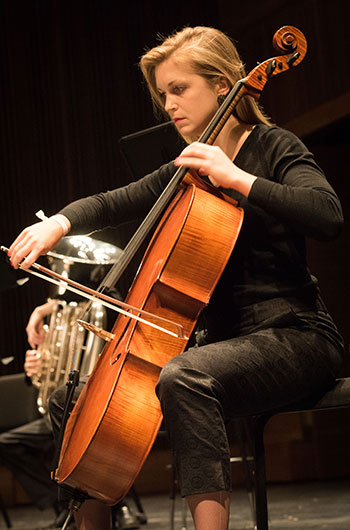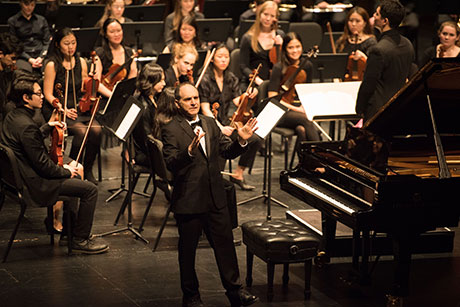Music and Medicine brings a healing art to Lincoln Center
By Beatrice Vantapool

Laura Radlinski, a physician assistant student at Weill Cornell Medical College, spent most of a recent Tuesday assisting in placing a lengthening rod into a patient’s arm, but after nearly 12 hours in the operating room, she had much more to accomplish that day.
Still wearing her scrubs, she sprinted the seven blocks home and quickly changed into an all-black ensemble of a long-sleeve V-neck sweater, pants and heels. She grabbed her cello and headed off to Lincoln Center, where she would perform later that evening as part of the Music and Medicine Initiative.
Over the last few weeks, Radlinski, along with fellow Weill Cornell Medical College students and faculty members, juggled her medical duties with strict rehearsals of symphony pieces including Tchaikovsky’s “Romeo and Juliet, Fantasy Overture,” Rachmaninoff’s Piano Concerto No. 2 in C minor, and a world premiere piece, “Emergent Machine” by Paul Frucht. Their efforts culminated in a debut performance at the packed Peter Jay Sharp Theater at Juilliard on March 10.
“To play in a major place like this is pretty unbelievable,” said Radlinski, who will graduate from Weill Cornell’s Master of Science in Health Sciences for Physician Assistants Program in May. “I knew it was going to be so exciting.”
The spring performance brought together a variety of serious amateur and conservatory-trained musicians from Weill Cornell Medical College, plus Rockefeller University, the Juilliard School and other New York City institutions. For many Weill Cornell students, the initiative was a key factor in their decision to attend the medical college, and getting the chance to play at Juilliard was not only a dream come true for many, but also an opportunity to share with a broader audience the healing power of music.
“The initiative was actually one of the main factors that drew me towards Weill Cornell,” said Peter Hung, a first-year student and violin player. “It’s really rewarding when you’re playing for patients and their faces light up at a familiar tune. It’s what we aim to do.”
While the Lincoln Center concert was a first for the performers, the Music and Medicine Initiative itself is not new. A partnership, created by founder and chairman Dr. David Shapiro, between the Juilliard School – one of the world’s leading music and arts institutes – and Weill Cornell, the program gives medical students the chance to continue their musical lives, including playing for patients at the NewYork-Presbyterian/Weill Cornell Medical Center and performing alongside some of Juilliard’s performing artists in the initiative’s orchestra, led by initiative conductor Yuga Cohler, the youngest graduate of the Juilliard School’s Master of Music program in orchestral conducting.
After the Music and Medicine Orchestra performed the Frucht and Tchaikovsky pieces, Dr. Richard Kogan, the piano soloist on the Rachmaninoff piece and a clinical professor of psychiatry at Weill Cornell Medical College, delivered an interactive, oral presentation on the importance of music in medicine. Before his performance, Kogan spoke about the melancholy life of the piece’s composer, Sergei Rachmaninoff, who suffered intense pain due to a rare disease. Music, it turns out, was the only treatment that gave him any relief.

“All of us in this initiative believe in the healing potential of music, and that’s something we very much wanted to emphasize during this concert,” said Kogan, who’s also the vice chairman and artistic director for the Music and Medicine Initiative.
He went on to speak more about Rachmaninoff’s life, and detail how the composer, whose first symphony was a failure, was treated with hypnotherapy to cure the resulting depression and writer’s block by Dr. Nikolai Dahl, to whom the piece was dedicated.
“We chose the Rachmaninoff piece because it would not even exist if not for the presence of a physician.”
After Kogan’s talk, the orchestra went on to perform the moving piece, the conclusion of the night’s program.
After the curtain dropped, the student performers expressed their awe at having been able to perform in such a famous venue and see their hard work come to life.
“It was a very humbling experience to perform here,” said Mark Sonnick, a trumpet player, second-year student at Weill Cornell and student co-chair of the Music and Medicine program. “During the dress rehearsals, I just kept thinking about how many people have worked so hard to have the opportunity to perform on that stage, and here we are.”
Beatrice Vantapool is a writer for Weill Cornell Medical College.
Media Contact
Get Cornell news delivered right to your inbox.
Subscribe